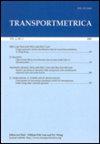Car allocation decisions in car-deficient households: the case of non-work tours
引用次数: 34
Abstract
This study examines the household interactions in the context of the car allocation choice decision in car-deficient households as part of an activity-scheduling process, focusing on non-work tours. A chi-square automatic interaction detector-based algorithm is applied to derive a decision tree using a large activity diary dataset recently collected in the Netherlands. The results show a satisfactory improvement in the goodness-of-fit of the decision tree model compared to the null model. Gender still plays a role. A descriptive analysis indicates that men, more often than women, get the car for non-work tours for which a car allocation decision needs to be made. Tour-level attributes also influence the household car allocation decision for non-work tours. Overall, men exert more influence on the car allocation decision for non-work tours, as indicated by the number of influential variables that relate to males. The developed models will be incorporated in a refinement of the ALBATROSS model – an existing computational process model of activity-travel choice.无车家庭的汽车分配决策:以非工作旅行为例
本研究以非工作旅行为研究对象,考察了汽车缺乏家庭在汽车分配选择决策背景下的家庭互动,作为活动调度过程的一部分。采用基于卡方自动交互检测器的算法,利用最近在荷兰收集的大型活动日记数据集,推导出决策树。结果表明,与零模型相比,决策树模型的拟合优度有了令人满意的提高。性别仍然起着作用。一项描述性分析表明,男性比女性更常在需要做出汽车分配决策的非工作旅行中开车。出行等级属性也会影响非工作出行的家庭用车分配决策。总体而言,男性对非工作旅行的汽车分配决策施加了更大的影响,与男性相关的影响变量的数量表明了这一点。开发的模型将被纳入对ALBATROSS模型的改进中,ALBATROSS模型是一种现有的活动-旅行选择计算过程模型。
本文章由计算机程序翻译,如有差异,请以英文原文为准。
求助全文
约1分钟内获得全文
求助全文

 求助内容:
求助内容: 应助结果提醒方式:
应助结果提醒方式:


